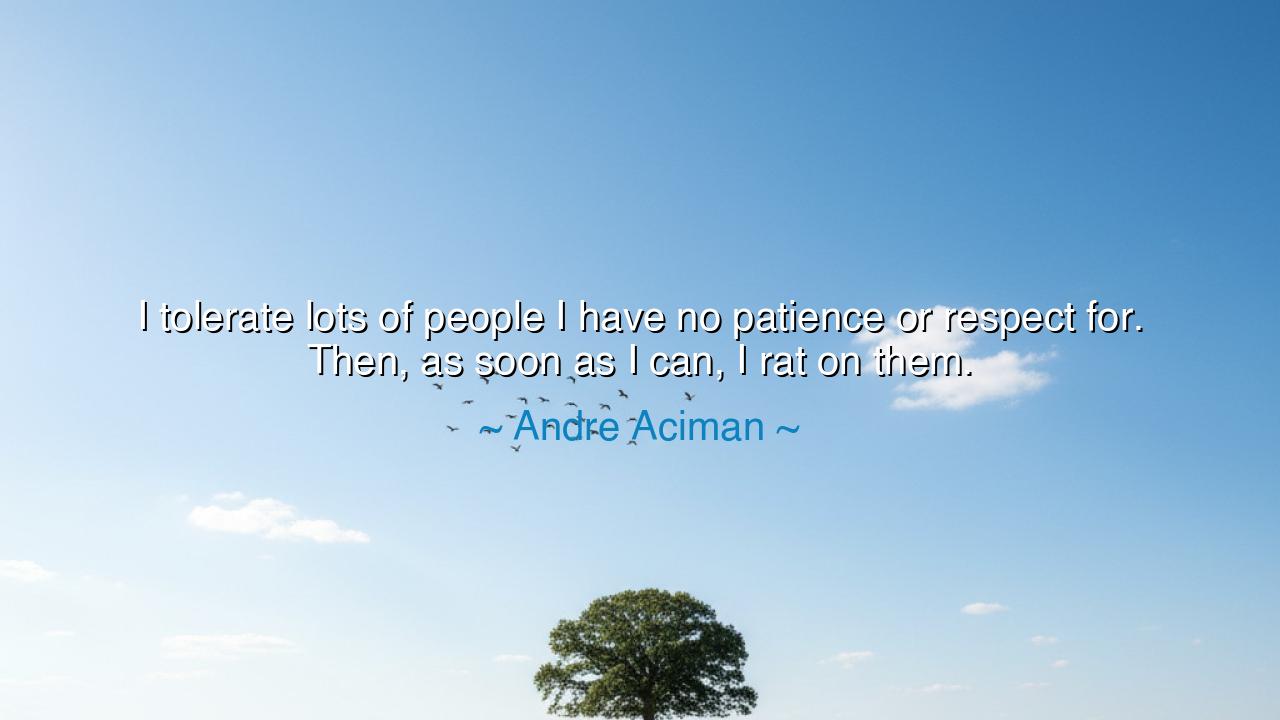
I tolerate lots of people I have no patience or respect for.
I tolerate lots of people I have no patience or respect for. Then, as soon as I can, I rat on them.






In the biting yet brutally honest words of André Aciman, there emerges a confession that speaks to the uneasy truth of human nature: “I tolerate lots of people I have no patience or respect for. Then, as soon as I can, I rat on them.” At first hearing, these words may strike the ear as cynical, perhaps even cruel. Yet beneath their sharpness lies a deeper understanding — not of betrayal or malice, but of the tension between civility and authenticity. Aciman, ever the philosopher of emotion, reveals the quiet hypocrisy that society demands of all who must live among others. He exposes, with startling candor, the masks we wear to survive in a world that prizes harmony over honesty.
The meaning of this quote rests in the duality of human behavior — our endless negotiation between what we feel and what we must show. To tolerate those we do not respect is the cost of civilization. It is the price paid for peace in workplaces, families, and nations. We feign patience where we feel contempt; we smile where the heart seethes; we nod in agreement where the soul silently recoils. Aciman’s admission does not glorify deceit — it illuminates it. He shows us that hypocrisy is not always born of wickedness but of necessity, for no one can live in constant warfare with the world. The act of “ratting on them” — of exposing, mocking, or dismissing — becomes a release, a moment when the inner truth erupts after being smothered too long by politeness.
The origin of these words can be traced to Aciman’s lifelong meditation on the human psyche. Born in Egypt, raised among shifting identities and exiles, he understood the art of adaptation — the subtle performances one must enact to fit among those who are not like oneself. His writings, such as Out of Egypt and Call Me by Your Name, reveal not just longing, but the ache of divided selves: the self that conforms and the self that rebels. In this quote, he gives voice to the quiet revolt that brews beneath social courtesy. It is a confession, yes, but also a mirror — for who among us has not smiled through clenched teeth, nodding while silently dissenting, waiting for the chance to unmask hypocrisy with our own?
The ancients, too, knew this struggle. Marcus Aurelius, the philosopher-emperor, warned of the exhausting presence of “meddling, ungrateful, arrogant, deceitful” men, yet he taught himself to endure them with reason and grace. Still, even the Stoic’s restraint must have trembled at times under the weight of his private thoughts. Like Aciman, he recognized that tolerance without inner peace corrodes the soul. But where Marcus sought calm through detachment, Aciman chooses revelation. He peels away the veneer of virtue to show us what festers underneath. His words remind us that pretending at goodness while harboring disdain can turn courtesy into quiet cruelty.
Yet we must not mistake Aciman’s statement for praise of treachery; it is instead an act of self-awareness. The man who admits his impatience and hypocrisy is more honest than the one who hides behind sanctimony. In this, there is a lesson of humility: to acknowledge the shadows within oneself is to begin to understand others. For when Aciman says he “rats on them,” he speaks not only of gossip or critique but of the human need to unburden oneself of pretense. It is the confession of a man weary of masks, who yearns to speak truth even when it is uncomfortable. In a sense, he is not condemning others, but exposing his own frailty — the same frailty that dwells in us all.
Consider the story of Diogenes the Cynic, the philosopher who carried a lantern through Athens in search of an honest man. Diogenes detested hypocrisy and mocked the pretense of virtue among the powerful. He, too, “ratted” on those he found false — not out of spite, but out of devotion to truth. His laughter and his provocations were meant to wake the sleeping conscience of the city. Aciman’s confession carries that same lineage — a cynicism that is not cruelty but clarity, the sharpness of the mind that refuses to be dulled by polite lies. In every age, truth-tellers are misunderstood as cynics, but their cynicism is a form of moral rebellion against falseness.
The lesson, then, is not that one should betray others, but that one should be honest with oneself. If we must live among those we dislike, let us at least recognize the cost of pretense. Let us not deceive ourselves into thinking that tolerance alone is virtue; true virtue requires sincerity. Learn to guard your peace without wounding others, and to speak truth without cruelty. If you find yourself surrounded by hypocrisy, do not descend into bitterness, but rise into integrity. For silence born of wisdom is higher than gossip born of frustration — and patience grounded in compassion is stronger than anger disguised as wit.
So let these words of André Aciman be remembered not as a confession of weakness, but as a challenge to the self: to live honestly, to see one’s contradictions clearly, and to reconcile the public mask with the private truth. The wise understand that every human heart is divided — between civility and candor, tolerance and truth. The task of life is not to destroy that division, but to navigate it with grace. Respect others when you can, endure them when you must — but above all, be truthful with yourself, for that is where all real respect begins.






AAdministratorAdministrator
Welcome, honored guests. Please leave a comment, we will respond soon